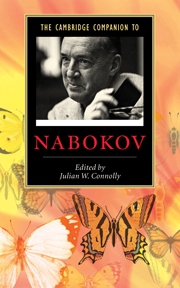Book contents
- Frontmatter
- Introduction
- Part I Contexts
- Part II Works
- 6 Nabokov as poet
- 7 Nabokov’s short fiction
- 8 The major Russian novels
- 9 From Sirin to Nabokov
- 10 Nabokov’s biographical impulse
- 11 The Lolita phenomenon from Paris to Tehran
- 12 Nabokov’s late fiction
- Part III Related worlds
- Guide to further reading
- Index
- Series List
11 - The Lolita phenomenon from Paris to Tehran
from Part II - Works
Published online by Cambridge University Press: 28 May 2006
- Frontmatter
- Introduction
- Part I Contexts
- Part II Works
- 6 Nabokov as poet
- 7 Nabokov’s short fiction
- 8 The major Russian novels
- 9 From Sirin to Nabokov
- 10 Nabokov’s biographical impulse
- 11 The Lolita phenomenon from Paris to Tehran
- 12 Nabokov’s late fiction
- Part III Related worlds
- Guide to further reading
- Index
- Series List
Summary
The history of Lolita, Nabokov's third novel in English, is nearly as bizarre as the story related in its pages. The narrator, Humbert Humbert, is a middle-aged European whose benighted passion for a twelve-year-old American girl drives him to make her his mistress. Years before the manuscript was rejected by a series of American publishers, Lolita's author nearly destroyed it himself. On a summer's day in 1950, riddled with doubts about the novel, Nabokov was on his way to the garden incinerator to burn its initial chapters when his wife, Véra, persuaded him to reconsider. As the novelist explained six years later, in his afterword to Lolita's belated American edition, “I was stopped by the thought that the ghost of the destroyed book would haunt my files for the rest of my life” (Lo, 312 [ “On a Book Entitled Lolita”]). Nabokov gradually resumed work on the novel, which he completed in the spring of 1954. After five different American publishers found the subject too hot to handle, Lolita was brought out in Paris by the Olympia Press, best known for the frank sexual content of its publications. Rescued from oblivion by the prominent British novelist, Graham Greene, who praised Lolita's artistic merits in the pages of the London Sunday Times, the novel quickly became the focus of a legal and literary controversy. Despite its championship by American writers and critics, Lolita was not published in the USA until 1958; it quickly became an international bestseller.
- Type
- Chapter
- Information
- The Cambridge Companion to Nabokov , pp. 185 - 199Publisher: Cambridge University PressPrint publication year: 2005
- 1
- Cited by

